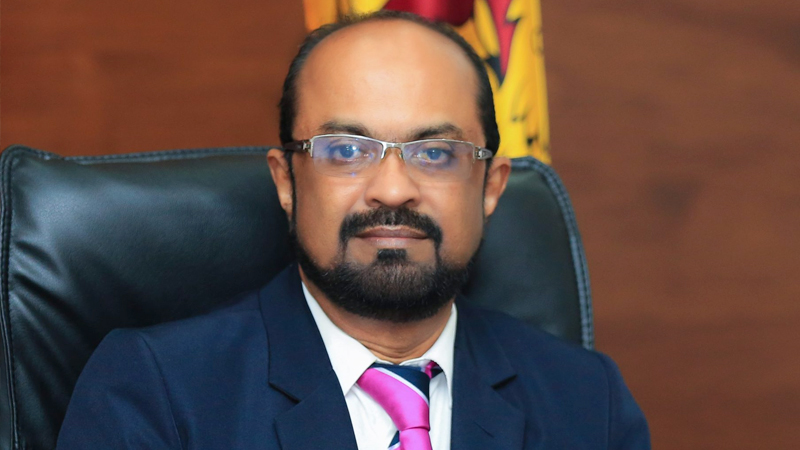 As global geopolitics increasingly impact energy markets, Sri Lanka faces serious concern over fuel security, renewable energy ambitions, and energy sovereignty. In this exclusive interview, the Minister of Energy Eng. Kumara Jayakody spoke to the Sunday Observer regarding the Middle East conflict, the future of renewables, the climate commitments, and whether Sri Lanka will fall under external energy influence.
As global geopolitics increasingly impact energy markets, Sri Lanka faces serious concern over fuel security, renewable energy ambitions, and energy sovereignty. In this exclusive interview, the Minister of Energy Eng. Kumara Jayakody spoke to the Sunday Observer regarding the Middle East conflict, the future of renewables, the climate commitments, and whether Sri Lanka will fall under external energy influence.
Q: With the ongoing conflict in the Middle East, how will fuel supply to Sri Lanka be affected? Should Sri Lankans be concerned?
A: As a small nation without any fossil-fuel reserves, Sri Lanka is vulnerable to disruptions. However, I do not believe this conflict will inflict severe consequences on us. The Government has a vital responsibility to mitigate any potential fallout, and we are preparing accordingly.
Currently, we hold adequate reserves of both refined and crude oil. Stockpiles should last until the end of August, and orders are already placed on schedule beyond that. More than 95 percent of our fuel supply comes from sources outside the Middle East, and we have formal agreements with SINOPEC, Shell and Indian Oil Corporation to ensure uninterrupted deliveries.
Nevertheless, we are proactively expanding arrangements with Nigeria and South Sudan should contingencies arise. If the conflict escalates, it will certainly affect global fuel supply. And Sri Lanka is not immune to this. But we are doing everything in our power to soften the impact on consumers.
Q: Despite the buffer stocks, can Sri Lankans expect a fuel-price increase?
A: Should conditions deteriorate, safeguarding supply must take precedence over price. Thanks to the mitigation strategies in place, I do not anticipate a domestic price hike. We remain committed to stability where possible.
Q: The Government has faced criticism over its renewable‑energy policy in recent months. Is there a delay in implementing its renewable-energy strategy?
A: Renewable energy is unquestionably our future. Many developed nations have driven this shift over decades, and comparatively Sri Lanka is late to the transition. We have made significant progress. In recent weeks, over 70 percent of our electricity has come from renewable sources, and our target is to exceed 90 percent in the coming years.
However, integrating renewables demands caution and a comprehensive strategy. Unlike conventional fuel-based generation, renewables, let it be solar, wind or hydro, all of these are weather dependent. The unpredictable Sri Lankan climate poses technical challenges, and as the Government responsible for continuous power supply, we are duty-bound to manage that unpredictability.
Q: Some in the solar-power sector claim the Ministry is stalling its growth. Is your Ministry impeding solar’s potential?
A: Generating solar energy is not as straightforward as it may seem. Consumers won’t care about complexities such as grid stability during outages like the one in February. Most rooftop installations yield around 150 watts, whereas past administrations encouraged 600 watt systems without upgrading the grid to support such capacity. As a result, infrastructure strain occurs.
Currently, there are around 100,000 rooftop systems serving over seven-million electricity users. Naturally, we must prioritise broader grid needs over niche rooftop schemes. Some operators have turned this sector into what I would describe as a “mafia” profiteering from solar without regard for national infrastructure readiness.
That is not to say the Ministry is anti-solar. Indeed, we rely on private investment to stimulate the industry. But we will not tolerate exploitative practices. We will re-examine existing agreements and recalibrate payment mechanisms.
We must also acknowledge solar’s inherent limitations: no power at night, despite daytime excess. The solution lies in battery storage. Thus, the Ministry plans to tender for sixteen 10 MW battery packs to enable overnight grid discharge of stored solar energy.
Q: Sri Lanka has yet to reduce its reliance on coal. How does your renewable vision align with environmental commitments?
A: Sri Lanka is a signatory to the Paris Agreement, and we have pledged to phase out coal in power generation. The plant at Kerawalapitiya, for instance, was envisaged to operate for only 30 years and will likely be retired by the early 2040s. We are a developing country, and I believe some “green” prescriptions are impractical for nations at our stage of development.
Many developed countries did not grow by rigidly adhering to green policies. Consider India for an example. It attained progress without over‑prioritising green mandates. We have to understand that most of these concepts are just neo colonialist ventures to prevent us from reaching our full potential.
We must be pragmatic and evolve with technology. Forests alone cannot sustain our way of life. We remain committed to the UN Sustainable Development Goals and will pursue green options wherever they align with our national interest.
Q: The Adani Group’s withdrawal from Sri Lanka prompted both applause and concern. Will we hear more about the Adani Group in Sri Lanka?
A: The Adani departure was not politically motivated. They had an agreement to sell power at USD 8.28 per unit. It was an uncompetitive rate compared to India’s USD 0.35. Such pricing would burden Sri Lankan consumers. It is simply unfair. There’s a mandate the people of this country have for us. So we set a cap at USD 0.50 per unit. For the welfare of our people.
Adani then chose not to proceed under those terms. They realised they can’t go about the way they did with previous Governments. We have since initiated international tenders; sixteen firms have already submitted bids. We have also asked Adani to submit a tender for this. No special preferences. If their new tender matches our objectives, then we might come to a compromise. We are ensuring fair competition, foreign or domestic, while insisting that profits from our natural resources be paid in Sri Lankan rupees.
Regarding concerns about wind farms near Mannar, I have to say this. Mannar isn’t some Paradise like many claim it to be. Certain factions in the society claim that wind turbines will devastate birds, destroy wildlife are, in my view, alarmist. I have visited the area and observed nothing to support these theories. You go from Mannar to the North of Pooneryn; it’s just stale land. People talk about birds but there are no birds there – nowhere from Mannar to Pooneryn. It is incumbent on us to integrate these areas into national development. But if we can generate power from Mannar, why should we not?
Q: What is the Government’s stance on nuclear energy?
A: We consider small-scale nuclear power plants as a viable option, given their low production costs. However, the upfront capital and maintenance costs remain high. For now, we are exploring other avenues.
We plan to unveil a draft hydrogen policy soon. It will be available to the public in the coming months. This will add another dimension to our energy diversification plans.
Q: Shell has re‑entered the Sri Lankan market, prompting public concern. Why has Shell been allowed back after it was previously expelled?
A: Shell’s return was initiated and negotiated under the previous administration. Under that agreement, Shell was allocated 150 service stations, with an additional 50 to be developed subsequently. These were not decisions made by the present Government. They were predetermined international contracts. Agreements with SINOPEC and Indian Oil Corporation similarly pre-date us, yet the same people have no problem with those agreements.
Q: The recent geopolitical climate has reignited debate over Sri Lanka’s planned electricity grid connection to mainland India. Critics said it could give India undue influence over Sri Lanka’s energy supply. What is your response?
A: The NPP Government will never allow control of Sri Lanka’s energy sector to be handed over to another nation. Whether India, China or anyone else. We will uphold complete energy sovereignty.
We seek to engage with our neighbours on a basis of mutual respect and cooperation. India is a neighbour. We will move forward together with our neighbour. No country is bigger and important to us than India. Just as Sri Lanka needs India, India needs us too.So we work with that understanding.







